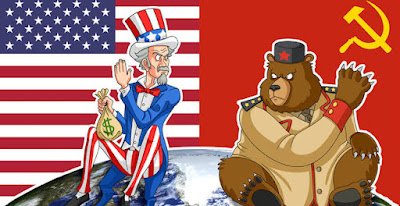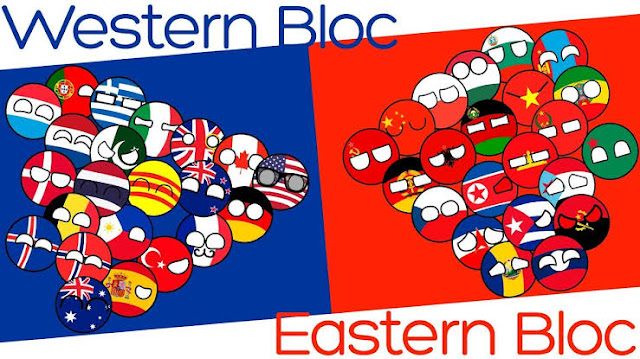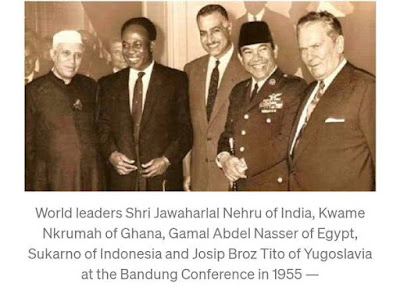🄲🄷🄰🄿🅃🄴🅁---- 1
What is the Logic of deterrence*
The term "DETERRENCE" signifies a logic developed by the two super powers to avoid any nuclear war.
+ the term refers Both superpowers have the capacity to respond(or retaliate) against any attack and to cause so much destruction that neither can afford to initiate war.
+ Thus, in spite of being an intense form of rivalry between two superpowers -it remained a cold and not hot war.
+ The deterrence relationship prevents war but not the rivalry between powers.
# Cuba was a small island nation off the coast of the USA.
# Fidel Castro was the president of this country at that time.
# Cuba was an ally of the Soviet Union and received both diplomatic and financial aid from it.
# In April 1961, the leader of the USSR(Union of soviet socialist republics) was worried that the United States of America (USA) would invade Cuba (communist) and overthrow its President, Fidel Castro.
#In 1962, Nikita Khrushchev, the leader of the Soviet Union placed nuclear missiles in Cuba and converted them into a Russian military base.
#When Americans came to know about it then John F Kennedy, the president of the United States wanted the USSR should remove the missiles and nuclear weapons from Cuba.
# So he ordered US warships to intercept any Soviet ships heading to Cuba as a way of warning to the USSR.
#This clash between US and USSR came to be called as "Cuban missile crisis".
🄴🄼🄴🅁🄶🄴🄽🄲🄴 🄾🄵 🅃🅆🄾 🅂🅄🄿🄴🅁 🄿🄾🅆🄴🅁 🄱🄻🄾🄲🅂**
After the 2nd World war, the scenario of the world changed.
* The other important development was the non-aligned movement which gave the newly independent countries a way of staying out of alliances.
Why smaller countries make alliances with superpower blocs?
Smaller states used the link with the superpowers for their own purposes. They get the promise of protection, weapons, and economic aid against their local rivals, mostly regional neighbors with whom they had rivalries.
Why superpowers make alliances with smaller states?
Due to the following reasons, power bloc's make alliances with smaller states÷
◆ Location ~ superpowers need to spy on each other. thus small countries play a very important role in providing locations.
◆ Vital Resources ~ superpowers wanted to utilize their vital resources such as minerals and oils of small countries.
◆ Territories - they need territories to launch their weapons and troops.
◆ Economic support ~ many smaller lives together could help pay for military expenses.
◆ Ideological Reason~ both superpowers wanted to win an ideological war that liberal democracy band capitalism was better than socialism and communism or vice versa.
Cold war threatened to divide the world into two alliances. Under these circumstances, many of the newly independent countries after gaining their independence from the colonial powers such as Britain and France were worried that they would lose their freedom as soon as they came to formal independence.
But in the 1960s, the development of the non-aligned movement give the newly independent countries away from the steam out of the alliances.
🄰🅁🄴🄽🄰🅂 🄾🄵 🅃🄷🄴 🄲🄾🄻🄳 🅆🄰🅁
It refers to Areas where crisis or war occurred or threatened to occur between the alliances' system but did not cross certain limits.
Non-aligned movement played a crucial role in reducing cold war conflicts and averting some grave crises.
Nehru, one of the key leaders of Nam play a crucial role in mediating between the two Koreas. Similarly, the UN secretary-general in Congo played a key mediatory role.
In 1960s the two sides signed three significant agreements within a decade. The motto was to maintain a balance of weapons through arms control. This treaty were-
■ Limited Test Ban Treaty (LGBT)
It banned nuclear weapons tests in atmosphere, outer space and under water.
Signed by US, UK, USSR signed in Moscow in 5th August,1963.
Entered into force-10 oct, 1963.
■ Nuclear non-proliferation treaty(NPT)
Allows only nuclear weapons states- have nuclear weapons- stops others from acquiring them.
NPT- nuclear weapons state is one that has manufactured and exploded a nuclear weapons or nuclear expolsion service prior to 1st January,1967.
Five nuclear weapons state- US, USSR, BRITAIN, FRANCE, CHINA.
Signed in Washington, London, and Moscow-1st July 1968.
Implemented in 5th March 1970.(extended indefinitely till 1995)
■ Anti-ballistic missile treaty(ABMT)
Signed Between the US and USSR on limitation of Anti ballistic missile(ABM) SYSTEM used in defending areas against ballistic missile- delivered nuclear weapons.
Signed in 1972- in force for next 30 years.
2002 US withdrew from the treaty led to its termination.
thereafter the superpowers held several rounds of arms limitations, talks and signed several more treaties to limit their arms.

🄲🄷🄰🄻🄻🄴🄽🄶🄴 🅃🄾 🄱🄸🄿🄾🄻🄰🅁🄸🅈
✓ These five leaders came to be known as the five founders of NAM.
🄾🄱🄹🄴🄲🅃🄸🅅🄴 🄾🄵 🄽🄾🄽 🄰🄻🄸🄶🄽🄴🄳 🄼🄾🅅🄴🄼🄴🄽🅃
★ Cooperation among these 5 countries,
★Growing cold war tensions and its widening areas;
★The dramatic entry of many newly colonized African countries.
🄽🄰🄼- 🄸🅂🄾🄻🄰🅃🄸🄾🄽🄸🅂🄼 🄾🅁 🄽🄴🅄🅃🅁🄰🄻🄸🅃🅈 ?????
Non-alignment is not isolationism because
1... isolationism means remaining aloof from world affairs.
2.....but the non-aligned countries including India played an active role in mediating between the two rival alliances in the cause of peace and stability.
Non-alignment is also not neutral in nature
1.... Because Neutrality refers to a policy of staying out of wars,
2....but non-aligned States include in India were actually involved in words for various reasons.
3....they also worked to prevent wars between others and try to end wars that had broken out.
🄽🄴🅆 🄸🄽🅃🄴🅁🄽🄰🅃🄸🄾🄽🄰🄻 🄴🄲🄾🄽🄾🄼🄸🄲 🄾🅁🄳🄴🅁 (NIEO)**
The challenge for the non-aligned countries was that
I-- most of them were categorized as least developed countries ( LDC )
ii-- which needs to be more developed economically and
iii- lift their people out of poverty.
The idea of a (NIEO)new international economic order originated with this realization.
The United Nations Conference on Trade and development UNCT brought out a report in 1972 and titled as "towards a new trade policy for development". This report proposed the following reforms---
✓ give the LDCs control over their natural resources which were being exploited by the developed western countries.
✓ Obtain access to Western markets so that the LDCs could sell their products and therefore make trade more beneficial for the poor countries.
✓ Reduce the cost of technology from the western countries, and
✓ provide the ldcs with the greater role and international economic institutions.
🄸🄽🄳🄸🄰 🄰🄽🄳 🅃🄷🄴 🅃🄷🄴 🄲🄾🄻🄳 🅆🄰🅁
As a leader of NAM, India's response to the ongoing cold war was two fold-
1...At one level, it took particular care in staying away from the two alliances.
2...Second, it raised his voice against the newly decolonized countries who are becoming part of these alliances.
3... India's policy was neither negative nor passive...
NAM SERVED INDIA'S INTEREST-
1. PROVIDED OPPURTUNITY TO TAKE INTERNATIONAL DECISIONS
✓ first non-alignment allowed India to take international decisions that serves its interest rather than the interest of the superpowers.
2. MADE INDIA CAPABLE OF BALANCING ONE SUPER POWER AGAINST THE OTHER.
✓ second India was often able to balance one superpower against the other. If India felt ignored or unduly pressurized by one superpower, it could tilt towards the other.
India's policy of nonalignment was criticized on various grounds-
1. India's nonalignment was said to be unprincipled in the name of pursuing its National interest, India it was said often refused to take a firm stand on crucial international issues.
2.It is suggested that India was inconsistent and took contradictory postures. Having criticized others for joining alliances, India signed the treaty of friendship in August 1971 with the USSR for 20 years.
This was regarded particularly by the outside observers as virtually joining the Soviet alliance system.
The Indian government's view was that India needed diplomatic and possibly military support during the Bangladesh crisis and that in any case, the treaty did not stop India from having good relations with other countries including the US.
These core values make Nam relevant even in today's scenario as it has stood of adverse circumstances...
1. TO MAINTAIN THE INDEPENDENT FOREIGN POLICY OF SMALL COUNTRIES.
2. TO DEMOCRATISE THE INSTITUTIONAL INTERNATIONAL SYSTEM.
3. TO FIGHT AGAINST TERRORISM.
************🆃︎🅷︎🅴︎ 🅴︎🅽︎🅳︎***************
DID YOU KNOW-
JOSIP BROZ TITO- was the president of Yugoslavia, fought against Germany in the second world war. He maintained some distance from the Soviet Union.
JAWAHARLAL NEHRU was the 1st prime minister of India. He made efforts for ASIAN unity, decolonization, nuclear disarmament. He advocated peaceful coexistence for securing world peace.
GAMAL ABDEL NASEER was the first premier of Egypt and ruled from 1952-1970. he espoused the cause of Arab nationalism, socialism and anti- imperialism. He nationalized the Suez canal leading to an international conflict in 1956.
Sukarno was the 1st prime minister of Indonesia. He led the freedom struggle and espoused the cause of socialism and anti- imperialism. He organized the BANDUNG CONFERENCE, overthrown in a military coup.
Kwame Nkrumah was the 1st prime minister of Ghana(1952-66). he led the freedom movement and advocated the cause of socialisms and African unity. he opposed neo-colonialism and was removed in a military coup.
Any doubt ask here?
































0 Comments
Give your valuable feedback